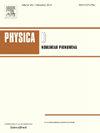Kernel Sum of Squares for data adapted kernel learning of dynamical systems from data: A global optimization approach
IF 2.7
3区 数学
Q1 MATHEMATICS, APPLIED
引用次数: 0
Abstract
This paper examines the application of the Kernel Sum of Squares (KSOS) method for enhancing kernel learning from data, particularly in the context of dynamical systems. Traditional kernel-based methods, despite their theoretical soundness and numerical efficiency, frequently struggle with selecting optimal base kernels and parameter tuning, especially with gradient-based methods prone to local optima. KSOS mitigates these issues by leveraging a global optimization framework with kernel-based surrogate functions, thereby achieving more reliable and precise learning of dynamical systems. Through comprehensive numerical experiments on the Logistic Map, Henon Map, and Lorentz System, KSOS is shown to consistently outperform gradient descent in minimizing the relative- metric and improving kernel accuracy. These results highlight KSOS’s effectiveness in predicting the behavior of chaotic dynamical systems, demonstrating its capability to adapt kernels to underlying dynamics and enhance the robustness and predictive power of kernel-based approaches, making it a valuable asset for time series analysis in various scientific fields.
基于数据的动态系统核学习的核平方和:一种全局优化方法
本文研究了核平方和(KSOS)方法在增强核学习数据中的应用,特别是在动力系统的背景下。传统的基于核的方法虽然具有理论合理性和数值效率,但在选择最优基核和参数调优方面经常遇到困难,特别是基于梯度的方法容易出现局部最优。KSOS通过利用基于核的代理函数的全局优化框架来缓解这些问题,从而实现更可靠和精确的动态系统学习。通过对Logistic Map、Henon Map和Lorentz系统的综合数值实验,KSOS在最小化相对-ρ度量和提高核精度方面始终优于梯度下降。这些结果突出了KSOS在预测混沌动力系统行为方面的有效性,证明了它能够使核适应潜在的动力学,并增强了基于核的方法的鲁棒性和预测能力,使其成为各种科学领域时间序列分析的宝贵资产。
本文章由计算机程序翻译,如有差异,请以英文原文为准。
求助全文
约1分钟内获得全文
求助全文
来源期刊

Physica D: Nonlinear Phenomena
物理-物理:数学物理
CiteScore
7.30
自引率
7.50%
发文量
213
审稿时长
65 days
期刊介绍:
Physica D (Nonlinear Phenomena) publishes research and review articles reporting on experimental and theoretical works, techniques and ideas that advance the understanding of nonlinear phenomena. Topics encompass wave motion in physical, chemical and biological systems; physical or biological phenomena governed by nonlinear field equations, including hydrodynamics and turbulence; pattern formation and cooperative phenomena; instability, bifurcations, chaos, and space-time disorder; integrable/Hamiltonian systems; asymptotic analysis and, more generally, mathematical methods for nonlinear systems.
 求助内容:
求助内容: 应助结果提醒方式:
应助结果提醒方式:


